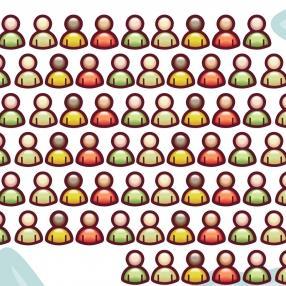 Print this Article
Print this Article

The Halachot of counting people and possessions
Adapted from a Shiur by Rav Dov Bresser
In an increasingly statistics-based society, we are always counting, measuring and polling. Governments count votes and constituents in order to function as democracies, gauge policies and provide services. Scientists and doctors count cured or infected patients in order to properly assess the effectiveness of a cure or prevalence of a condition. Even community institutions such as schools and synagogues count their students and members regularly in order to function properly.
According to Halacha, there is a clear prohibition to count the Jewish people. The Gemara in Berachot[1] derives this from the verse[2]: “כי תשא את ראש בני ישראל וגו'” – which clearly directs Moshe Rabbenu not to count the Jewish people outright to avoid a Negef. The Gemara in Yoma[3] adds that it is forbidden to count the Jewish people even for the purpose of a Mitzva, as we see from Shaul HaMelech who only counted his men indirectly, using earthenware pieces[4] or sheep[5].
The Gemara seems to imply (as the Radak notes on this verse) that even when counting Jews indirectly, this is only permissible for the purpose of a Mitzva, but for a mundane purpose even that is forbidden. The Or HaHayim HaKadosh is of the opinion that using Shekalim – as was done in the times of Moshe – it is permissible, even for a mundane purpose, however, this seems to be a minority opinion.
The Rambam in Hilchot Temidin writes that this is the reason why in the Bet HaMikdash the Kohanim would raise a finger when they were counted in the course of the lottery to assign them their jobs. Although this Halacha is not mentioned in the Shulhan Aruch, it is clearly the consensus of all Poskim ().
The Magen Avraham[6] writes that counting is even forbidden when one’s intention is not to know the total amount. The Tzitz Eliezer adds that this prohibition clearly applies even when counting a segment of the Jewish people. That is why when we count men for a Minyan we use a Passuk instead of counting outright.
The Michtav Me’Eliyahu and Tzitz Eliezer – based on Rashi in Ki Tissa – explain that the reason for this prohibition is that one is creating some sort of Ayin HaRa – evil eye. The Michtav Me’Eliyahu further explains this concept and writes that when one tells people that he has this many children or students etc. it may cause envy and is potentially harmful. The Sifte Hayim adds that reducing Am Yisrael to a number detracts from their oneness and uniqueness.
The Hattam Sofer, cited by his son, the K’tav Sofer, maintains that this prohibition applies is even when was is counting in writing. Modern-day Poskim, such as the Tzitz Eliezer, write that this would also apply to counting via computer.
Counting in one’s mind, however, is permitted. Thus one may count a Minyan outright in their head without expressing the count. The Poskim also allow one to estimate an amount of people without a precise count. So, for example, one may say that there approximately a hundred people in a room.
Elections and Censuses
With regards to counting votes, many Poskim understand that this is permitted because it is indirect (as the ballots are being counted not the voters themselves) and it is for a constructive and necessary purpose.
However, the issue of census is a subject of some debate among the Poskim. Whereas this would not be a problem in America and other places in which the census counts mainly non-Jews, some Poskim, such as Rav Moshe Shternbuch, the Tzitz Eliezer and the Steipler, forbid taking part in the Israeli census, because there is an insignificant amount of non-Jews mixed into the count. However, for a necessary purpose – such as determining the amount of soldiers needed for a draft or other such purposes – it would be permitted as we previously mentioned, so long as the people are not counted outright (i.e. the applications are counted).
Similarly, a Yeshiva or shul may count its members for a constructive purpose by counting applications or in other indirect ways.
Counting Possessions
The Gemara in Ta’anit[7] advises that one shouldn’t even count his possessions, because Beracha can only be found in what is hidden from the eye. The reason given by the Poskim also has to do with Ayin HaRa. The Sifte Hayim adds, that one counts his possession, he is giving importance to the material.
Indeed, the Zohar asks, if there is no Beracha in what is counted, why does the Torah provide a detailed account of the donations brought to the Bet HaMikdash? The Zohar answers that when it comes to Keddusha the Beracha is not affected by the count. This can be understood according to the aforementioned reason of the Sifte Hayim, that when it comes to Keddusha we are encouraged to count and value it. This will also spur one to be even more involved in Avodat Hashem. That is why it is permissible to take account of one’s possessions for the purpose of giving Ma’aser.
Sources:
[1] ס”ב ע”ב
[2] שמות ל’, י”ב
[3] כ”ב ע”ב
[4] שמואל א’, יא,ח
[5] שם טו, ד
[6] סי’ קנו
[7] ח’ ע”ב